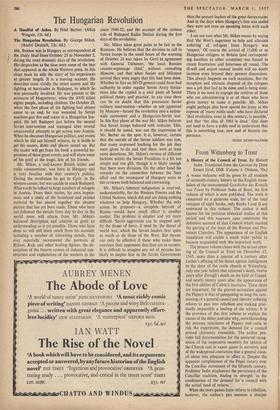The Hungarian Revolution
The Hungarian Revolution. By George MikeS. (Andre Deutsch, 12s. 6d.)
MR. BARBER was in Hungary as correspondent of the Daily Mail from October 25 to November 2, during the most dramatic days of the revolution. His despatches at the time were some of the best that appeared in the whole Western press. In this short book he tells the story of his experiences at greater length. It is a moving account. He describes most vividly the street scenes and the fighting at barricades in Budapest, in which he was personally involved. He was present at the massacre of Magyarovar, when the AVO killed eighty people, including children. On October 28, when the first phase of the fighting had almost come to an end, he was wounded by Soviet machine-gun fire and taken to a Hungarian hos- pital. He left Budapest just before the second Soviet intervention and managed after several unsuccessful attempts to get across into Austria. When he discusses Hungarian politics, and events which he did not himself witness, he is liable to get his names, dates and places mixed up. But the reader will get from his book a powerful im- pression of these great events, and will share some of his grief at the tragic fate of his friends.
Mr. Mikes, a well-known British writer and radio commentator, was born in Hungary and is very familiar with that country's politics. During the revolution he got to Gyor, in the western corner, but was unable to reach Budapest. Afterwards he talked to large numbers of refugees in Austria. From their stories, his own impres- sions and a study of the broadcast and printed material he has pieced together the clearest picture that has yet been made. Those who have not followed the details from day to day in the world press will obtain from Mr. Mikes's balanced description and analysis as good an understanding as is yet possible. Those who have done so will still learn much from his account, including a number of interesting details. One may especially recommend the portraits of Riikosi, Rajk and other leading figures; the de- scription of the bizarre system of industrial con- struction and exploitation of the workers in the years 1949-52; and the account of the curious role of Budapest Radio Station during the first days of the revolution.
Mr. Mikes takes great pains to be fair to the Russians. He believes that the decision to call in Soviet troops in the small hours of the morning of October 24 was taken by Gerd in agreement with General Tikhonov, 'the local Russian counter-espionage chief,' without consulting Moscow, and that when Suslov and Mikoyan arrived they were angry that this had been done. Whether in fact an MVD general could have had authority to order regular Soviet Army forma- tions into the capital is a nice point of Soviet political theory and practice. In any case there can be no doubt that this premature Soviet military intervention—whether or not approved by Moscow—turned the revolution into a nation- wide movement and a Hungarian-Soviet war. In this first phase of the war Mr. Mikes believes that Soviet troops behaved with restraint. This, it should be noted, was not the impression of Mr. Barber on the spot. It is, however, certain that the morale of the Soviet soldiers was low, that many expressed loathing for the job they were given to do and that there were at least some desertions. Mr. Mikes's version of different factions within the Soviet Presidium is a bit too simple and too glib, though it is likely enough that there were divisions. On the other hand his remarks on the connection between the Suez affair and the reconquest of Hungary seem to this reviewer both balanced and convincing.
Mr. Mikes's bitterest indignation is reserved, understandably, for the Western Powers and the United Nations, which did and are doing nothing whatever to help Hungary. Whether the only action he proposes—a complete boycott of Russia—would have much effect is another matter. The problem is simpler and yet more difficult. Soviet aggression can be stopped only by the threat of force, if need be, the threat of world war, which the Soviet leaders fear quite as much as do those of the West. But threats can only be effective if those who make them convince their opponents that they are in earnest. It is difficult to imagine any set of persons less likely to inspire fear in the Soviet Government than the present leaders of the great democracies. And in the days when Hungary's fate was sealed they were not even on speaking terms with each other.
I am not sure what Mr. Mikes means by saying that 'the West's eagerness to help and alleviate suffering' of refugees from Hungary was 'suspect.' Of course the arrival of 15,000 or so Hungarian refugees in Britain (and correspond- ing numbers in other countries) was bound to create frustration and bitterness all round. The ill-will and unjust mutual insults will no doubt increase even beyond their present dimensions. This always happens on such occasions. But the reception and ultimate disposal of the refugees was a job that had to be done and is being done. There is no need to impugn the motives of those who are administering it or of those who have given money to make it possible. Mr. Mikes might perhaps also have spared his irony at the expense of 'many noble souls' who have declared 'that revolution, even in this century, is possible,' and that 'the idea of 1984 is dead.' One does not need to have a noble soul to understand that this is something true, new and of historic im- portance.
HUGH SEION-WATSON


































 Previous page
Previous page